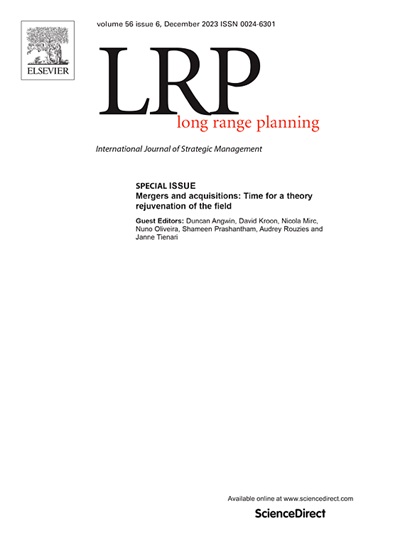为什么有些人不愿意分享:多单位组织中的竞争领域和知识转移
IF 6.3
2区 管理学
Q1 BUSINESS
引用次数: 0
摘要
在多单位组织中,如跨国公司(MNCs),在一个业务部门开发的知识可以极大地有利于另一个业务部门的绩效。然而,员工和管理者在组织内部竞争领域内与其他人竞争资源,这可能会影响知识共享的意愿。我们将多单元组织概念化为具有多个竞争领域,这取决于知识共享参与者的资源禀赋的主要来源。我们的研究利用了在一家跨国公司全球分部进行的两项调查的数据,包括来自24个国家68个不同单位的342名个人的数据。研究结果表明,不同竞争领域个体间的社会整合促进了单位间的知识转移,而同一竞争领域个体间的社会整合阻碍了单位间的知识转移。这些发现表明,在多单位组织中,社会整合有一个不同的、黑暗的一面,而不是之前建立的积极的一面,导致知识转移的增加。我们的研究结果表明,知识共享的意愿还取决于知识共享参与者之间对资源的内部竞争。本文章由计算机程序翻译,如有差异,请以英文原文为准。
Why some are less willing to share: Competitive domains and knowledge transfer in multi-unit organizations
In multi-unit organizations, such as multinational corporations (MNCs), knowledge developed in one business unit can greatly benefit the performance of another. However, employees and managers compete with others within intraorganizational competitive domains for resources, which may affect the willingness to share knowledge. We conceptualize the multi-unit organization as having multiple competitive domains depending on the main source for resource endowments for the knowledge-sharing actors. Our study draws on data from two surveys done in a global division of an MNC, comprising data from 342 individuals nested in 68 different units, across 24 countries. Our results show that social integration among individuals in different competitive domains boosts knowledge transfer between units, while social integration between individuals within the same competitive domain hampers knowledge transfer. These findings suggest that there is a different and darker side to social integration in multi-unit organizations than the previously established positive side leading to increased knowledge transfer. Our findings show that the willingness to share knowledge also depends on the internal competition for resources between the knowledge-sharing actors.
求助全文
通过发布文献求助,成功后即可免费获取论文全文。
去求助
来源期刊

Long Range Planning
Multiple-
CiteScore
13.00
自引率
7.10%
发文量
75
期刊介绍:
Long Range Planning (LRP) is an internationally renowned journal specializing in the field of strategic management. Since its establishment in 1968, the journal has consistently published original research, garnering a strong reputation among academics. LRP actively encourages the submission of articles that involve empirical research and theoretical perspectives, including studies that provide critical assessments and analysis of the current state of knowledge in crucial strategic areas. The primary user base of LRP primarily comprises individuals from academic backgrounds, with the journal playing a dual role within this community. Firstly, it serves as a platform for the dissemination of research findings among academic researchers. Secondly, it serves as a channel for the transmission of ideas that can be effectively utilized in educational settings. The articles published in LRP cater to a diverse audience, including practicing managers and students in professional programs. While some articles may focus on practical applications, others may primarily target academic researchers. LRP adopts an inclusive approach to empirical research, accepting studies that draw on various methodologies such as primary survey data, archival data, case studies, and recognized approaches to data collection.
 求助内容:
求助内容: 应助结果提醒方式:
应助结果提醒方式:


